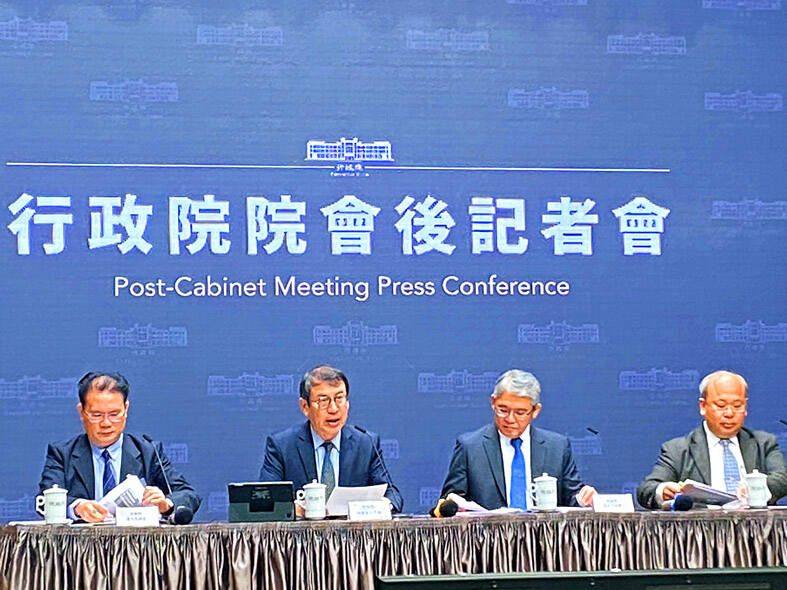Special municipalities should reserve 5 percent of land for social welfare housing projects, while other cities and counties should reserve 3 percent, according to a measure approved by the Executive Yuan yesterday.
Premier Chen Chien-jen (陳建仁) said that with the approval of the Measures to Promote Social Welfare Housing Policies and Increasing Usable Land for Housing Projects (推動社會住宅成果與提升社宅用地供給精進措施), the government aims to build 1 million social welfare housing units by 2031 and he had instructed the Ministry of the Interior to take charge of the policy.
Chen has also asked other ministries to work with the Ministry of the Interior on the measures, and has instructed the Ministry of the Interior to find legal bases to designate land exclusive for social welfare facilities.

Photo: Chung Li-hua, Taipei Times
Transit-oriented development and urban renewal projects should prioritize land or units reserved for social housing so the government’s goal of building social housing units can be met, the Ministry of the Interior said.
The government would also continue to offer its services to manage leases for landlords and use those houses as social housing, as well as its policies to provide subsidies for 500,000 individuals who are renting.
As of Nov. 30, the nation had built 91,189 social housing units — 46,732 units, or 51 percent, built by the central government and 44,457 units, or 49 percent, built by local governments — Minister of the Interior Lin You-chang (林右昌) said yesterday.
The number of units built by the central government had exceeded that built by local governments in just three years and the central government had built the units across the nation, including in outlying counties, he said.
He said that future construction projects by the central government would factor in actual living needs, the local population, industry development and distance to commute to work.
He said that the ministry is still inventorying public land nationwide and is planning to repurpose land that is not used to its full potential, including using old office buildings and shuttered schools for social housing projects.
Democratic Progressive Party presidential candidate Vice President William Lai (賴清德) had earlier pledged that if elected, he would see that the nation builds more than 1 million social housing units using various policies.
Over the past eight years, 200,000 social housing units have been added — 120,000 constructed by the government and 80,000 from government-sponsored leases, Lai said, adding that if elected, he would build an additional 130,000 units over the next eight years.
Lai said he also plans to expand government-sponsored leases to 170,000 units and increase the number of government subsidies to 500,000, which, on top of President Tsai Ing-wen’s (蔡英文) policy, would raise the total number of social housing units to 1 million.
Additional reporting by Hsu Yi-ping

Chinese Nationalist Party (KMT) Chairman Eric Chu (朱立倫), spokeswoman Yang Chih-yu (楊智伃) and Legislator Hsieh Lung-chieh (謝龍介) would be summoned by police for questioning for leading an illegal assembly on Thursday evening last week, Minister of the Interior Liu Shyh-fang (劉世芳) said today. The three KMT officials led an assembly outside the Taipei City Prosecutors’ Office, a restricted area where public assembly is not allowed, protesting the questioning of several KMT staff and searches of KMT headquarters and offices in a recall petition forgery case. Chu, Yang and Hsieh are all suspected of contravening the Assembly and Parade Act (集會遊行法) by holding

PRAISE: Japanese visitor Takashi Kubota said the Taiwanese temple architecture images showcased in the AI Art Gallery were the most impressive displays he saw Taiwan does not have an official pavilion at the World Expo in Osaka, Japan, because of its diplomatic predicament, but the government-backed Tech World pavilion is drawing interest with its unique recreations of works by Taiwanese artists. The pavilion features an artificial intelligence (AI)-based art gallery showcasing works of famous Taiwanese artists from the Japanese colonial period using innovative technologies. Among its main simulated displays are Eastern gouache paintings by Chen Chin (陳進), Lin Yu-shan (林玉山) and Kuo Hsueh-hu (郭雪湖), who were the three young Taiwanese painters selected for the East Asian Painting exhibition in 1927. Gouache is a water-based

Taiwan would welcome the return of Honduras as a diplomatic ally if its next president decides to make such a move, Minister of Foreign Affairs Lin Chia-lung (林佳龍) said yesterday. “Of course, we would welcome Honduras if they want to restore diplomatic ties with Taiwan after their elections,” Lin said at a meeting of the legislature’s Foreign Affairs and National Defense Committee, when asked to comment on statements made by two of the three Honduran presidential candidates during the presidential campaign in the Central American country. Taiwan is paying close attention to the region as a whole in the wake of a

OFF-TARGET: More than 30,000 participants were expected to take part in the Games next month, but only 6,550 foreign and 19,400 Taiwanese athletes have registered Taipei city councilors yesterday blasted the organizers of next month’s World Masters Games over sudden timetable and venue changes, which they said have caused thousands of participants to back out of the international sporting event, among other organizational issues. They also cited visa delays and political interference by China as reasons many foreign athletes are requesting refunds for the event, to be held from May 17 to 30. Jointly organized by the Taipei and New Taipei City governments, the games have been rocked by numerous controversies since preparations began in 2020. Taipei City Councilor Lin Yen-feng (林延鳳) said yesterday that new measures by